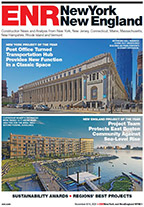New York City Mayor Michael Bloomberg laid out big plans in his final state of the city address today, Feb. 14, which included several initiatives that would call for industry-related services. This includes a proposal to amend the city's building codes to require that up to 20% of new parking spaces in private developments be "wired and ready" for electric cars. The mayor says this will create up to 10,000 parking spaces for such vehicles over the next seven years. He also proposed developing curbside vehicle charging stations that will allow drivers to charge batteries in 30 minutes.

The mayor called for raising the city's sustainability goals and doubling its recycling rate to 30% by 2017 by, in part, increasing the types of plastics that the city can accept for recycling. To that end, he mentioned the new plastics recycling facility set for completion this spring at the South Brooklyn Marine Terminal in Sunset Park. Under the mayor's PlaNYC2030 initiative and with a $48-million contribution from the city, Sims Metal Management has invested $46 million to develop the facility, which is a public-private partnership of Sims, the city's Sanitation and Small Business Services departments, and the NYC Economic Development Corp.
The mayor says the plant will be the largest household recycling plant in North America, will be powered by one of the largest solar installations citywide, and will operate the largest wind turbine in the city "since the Dutch built windmills in New Amsterdam."
Such efforts will raise the bar for the city, the "most tech-friendly, transparent government in the country," he said.
"We're taking a city built mostly before World War II and renewing it for the needs of New Yorkers today and tomorrow," he said after listing several projects nearing completion. These include the second phase of the single-largest construction project in the city's history, the City Water Tunnel No. 3, which he called, "an incredible testament to all the sandhogs who built it and deserve our thanks for the dangerous work that they do every day."
Among other the projects he spotlighted were 1 World Trade Center; the No. 7 line extension to Manhattan's Hudson Yards area, "the first subway track to be funded by the city in 50 years and the catalyst to the most ambitious development ever undertaken in our city"; and the third and final phase of the High Line, the elevated former railway on Manhattan's West Side.
Bloomberg praised the city's many academic, science and technology projects under way or planned, including "BioBat," the bioscience R&D center under way at the Brooklyn Army Terminal.
The mayor also mentioned the city's post-Superstorm Sandy rebuilding efforts, including work under way to determine how to better protect the city from extreme weather events. He thanked private firms "who stepped up" to help create the NYC Rapid Repairs program, which so far has restored heat and/or power to more than 17,000 homes severely damaged by the storm. He said that the Federal Emergency Management Agency says that it is the fastest home recovery program that it has ever seen.


